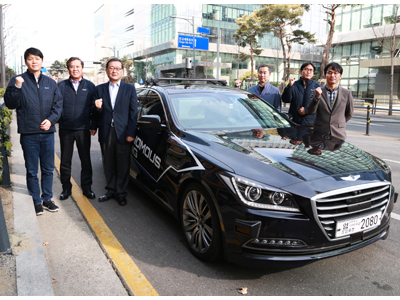Mando, an affiliate of Halla Group specializing in car components, announced that it has successfully tested level 4 autonomous driving, taking a step toward perfecting autonomous driving and developing the technology for commercial use.
Level 4 autonomous driving is full self-driving automation, according to the standard classification provided by the U.S. National Highway Traffic Safety Administration (NHTSA), referring to a car that is designed to drive to its destination by itself, without intervention of drivers.
The Mando demonstration carried chairman Chung Mong-Won, president Il-Hwan Tak and related researchers in “Hockey”, successfully completing 2.7 km at a speed of 40 km/hr on the public roads of Pangyo. The car navigated left turn, right turn and lane changes, as well as linear and curve driving without difficulty, receiving signals from front and corner radars, front cameras and surround cameras, developed by Mando, and LiDAR.
The Pangyo route was considered unfavorable for autonomous driving" many illegally parked vehicles and reflected sunlight from high-rise glass buildings — different than the operating environments in California or Arizona, where many U.S. autonomous driving tests are conducted, as well as the closed driving environments such as test tracks.
Hockey also demonstrated vehicle-object (V2X) communication technology, also essential for autonomous driving. Passing through road crossings, the vehicle received advance information such as signals using vehicle-infra (V2I) links.
Hockey received a permit for autonomous driving tests from the Korean Ministry of Land, Infrastructure and Transport in 2017.
This success of level 4 autonomous driving reflects Mando's technical philosophy prioritizing safety and reliability. Mando started mass production of ADAS products in 2010, succeeded in level 2 autonomous driving commercialization and is now focused on the development of level 3 commercialization, aiming for mass production in 2021. Mando is supplying core component hardware such as radars, cameras and ultrasonic sensors, as well as autonomous driving algorithms to car makers.
Autonomous driving requires sensing hardware to perceive external situations and information processing software to judge and act based on the sensor information. Mando is one of a few global enterprises supplying both.
Managing Director Gyu-Sik Park, head of Mando's Advanced-Development Center, said, "Mando has secured a perfect autonomous driving technology enabling safe driving even in congested downtown roads," adding, "We are going to achieve an autonomous driving commercialization level by reinforcing the AI technology by 2021 and by cooperating with domestic and overseas partners."
Director Chi-Gwon Choi, head of Mando's advanced development team, added, "Domestic autonomous driving technology is not behind those of the advanced countries. We can even be beyond the advanced countries if the related infra is expanded."
Mando also offers brakes, steering and suspension systems, such as "R-EPS" (a rack type electric power steering system), "ESC" (electronic stability control), calipers and shock absorbers.

